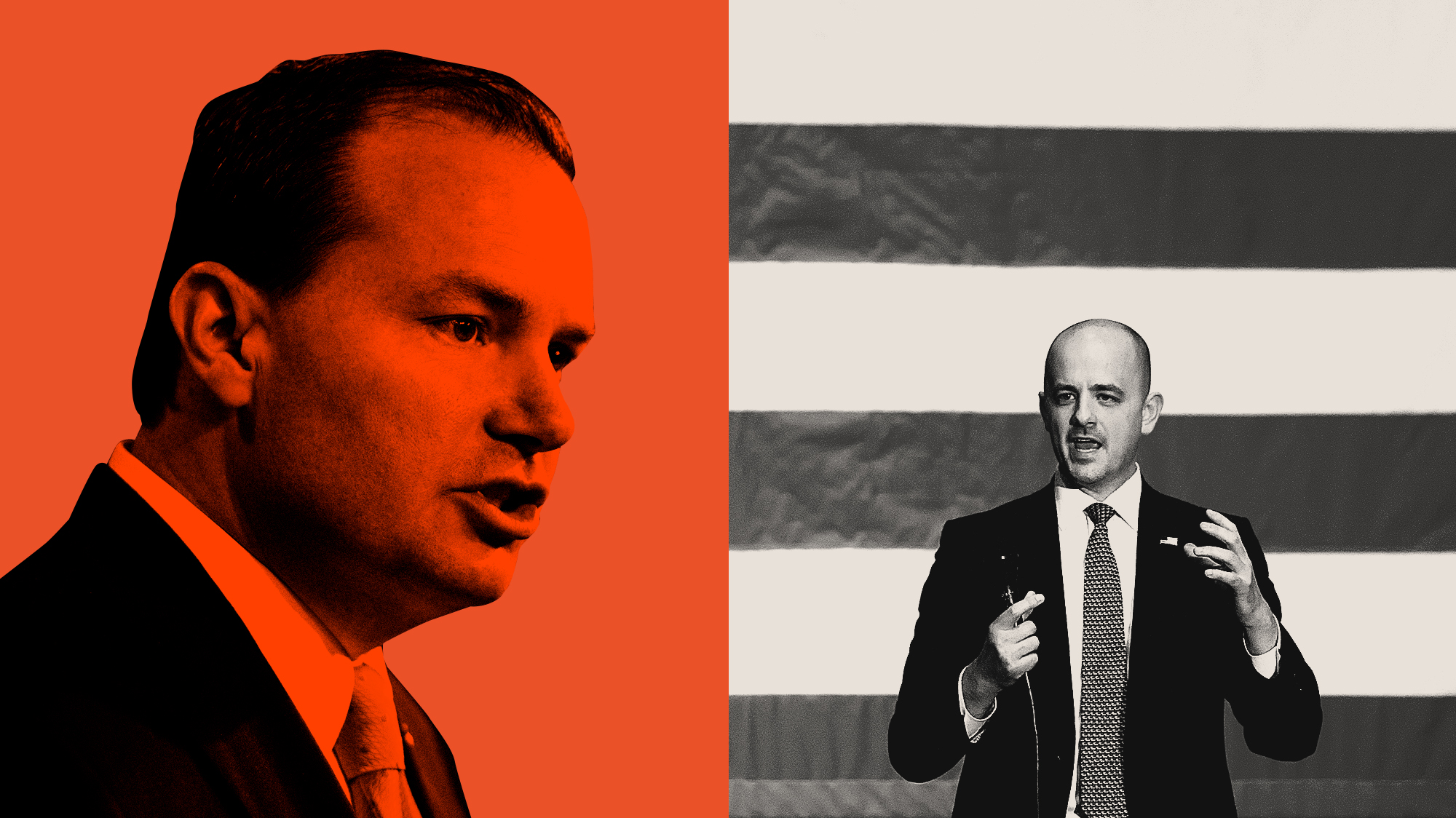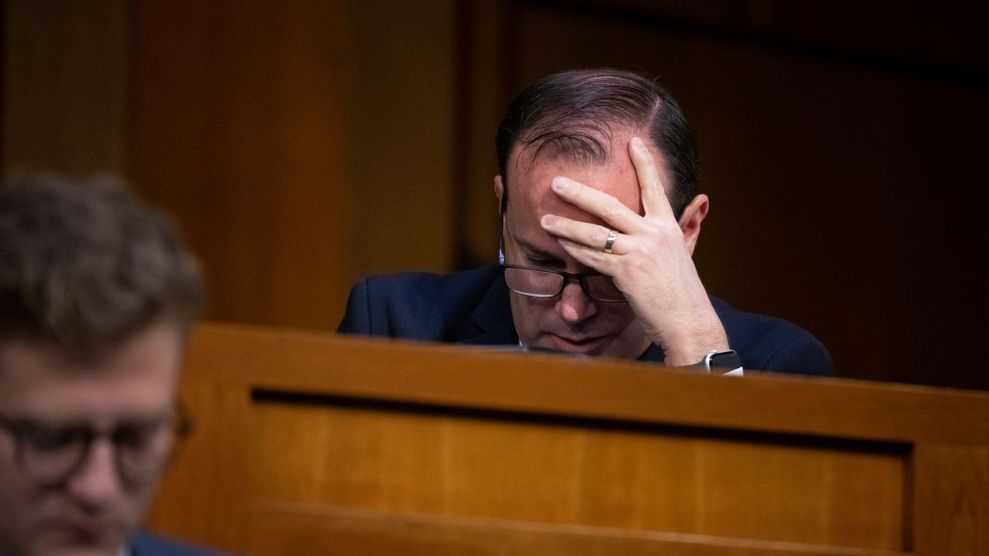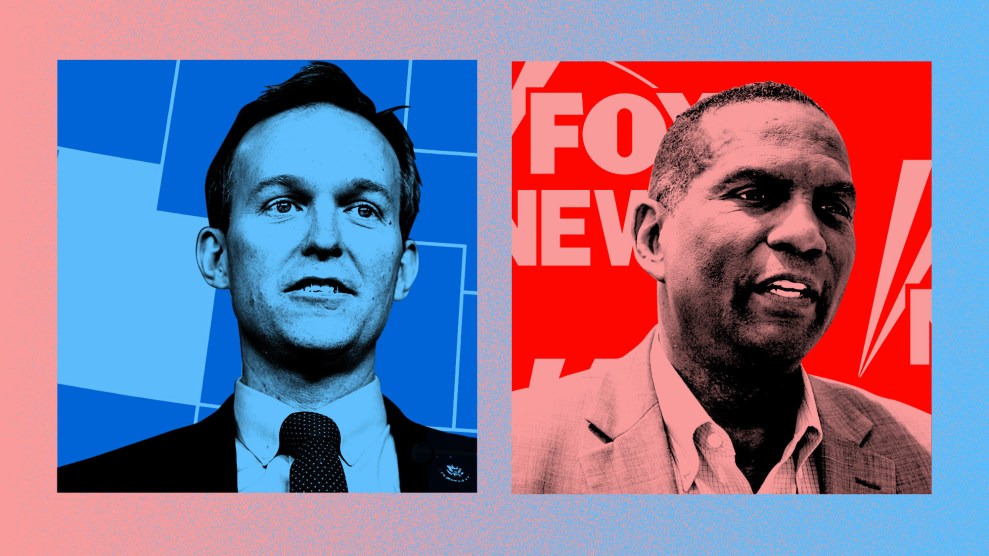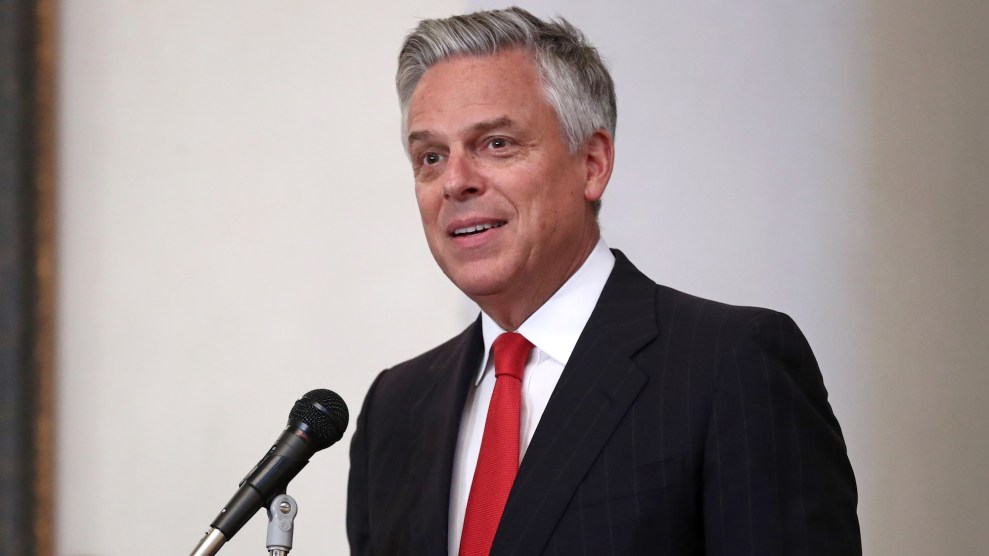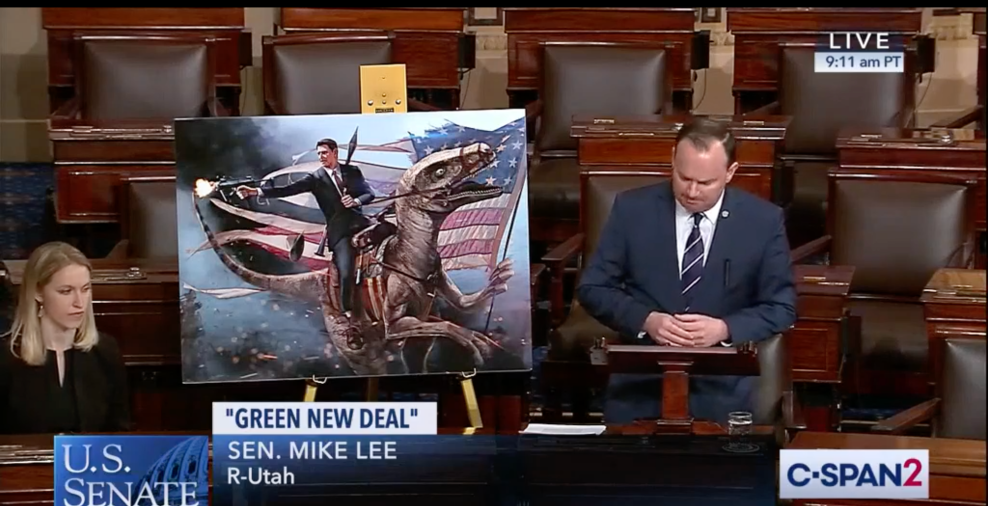In mid-October, the actor Mark Hamill, a.k.a. Luke Skywalker, turned his star power on Evan McMullin, who is running a surprisingly competitive race for Senate in Utah. First came the tweet: “I like @EvanMcMullin SO much, it makes me wish I lived in Utah so I could vote for him!*” Then a Zoom call, cheering on McMullin phone bank volunteers who’d gathered to kick off the final push in his unusual campaign to defeat incumbent Republican Mike Lee. “Mike Lee belongs to the party of extremists,” Hamill said. “We have to find common ground and that’s why you’re our greatest hope.”
Hamill compared the campaign to the fight against the Death Star, a battle of good versus evil in which McMullin and his supporters were “standing up against the forces of darkness.” In this case, the forces of darkness were not imperial stormtroopers, but the people who brought the country to the brink of a constitutional crisis on January 6 with an assist from Lee. “It’s scary to think that our democracy could be so fragile,” Hamill said. With little kids waving their lightsabers in front of their Zoom backgrounds, he expressed delight that Utah was home to such a huge number of Star Wars fans. “The Force is strong here,” McMullin replied.
I like @EvanMcMullin SO much, it makes me wish I lived in Utah so I could vote for him!*
*(FUN FACT: Brigsby Bear was filmed in Utah.🐻) https://t.co/eYnIV6W3nS
— Mark Hamill (@MarkHamill) October 11, 2022
McMullin’s campaign does indeed have the feel of the scrappy Rebel Alliance. The former CIA agent who challenged Donald Trump in the 2016 presidential election is running as an Independent in a state that has a lot of them—even though it unfailingly elects almost exclusively Republicans.
Over the past year, McMullin has tried to cobble together a coalition that unites many disparate groups: Democrats desperate for representation in a state that gives them almost none; independents with misgivings about Donald Trump; and Republicans dismayed about their party’s turn away from small-D democratic norms as demonstrated by Trump’s attempts to overturn the legitimate 2020 presidential election results. He’s doing it by putting democracy itself on the ballot. But can protecting democracy alone represent a winning election issue? And in Utah? “This is a great test of that,” says Mike Gehrke, a Democratic political consultant and Utah native. “Utah’s probably the best place to test it out because democracy is broken in Utah.”
In 2016, when McMullin ran for president, Latter-Day Saints’ politicians, including Utah’s senator Mike Lee and then-Rep. Jason Chaffetz (R-Utah), were among Trump’s loudest GOP critics. Their opposition drove a lot of breathless national media coverage suggesting that LDS voters in Utah might buck the hypocrisy of evangelical Christians and reject the crass, immoral candidacy of Donald Trump—even if it meant voting against a Republican for the first time in 40 years. Three weeks before the 2016 election, NBC’s Chuck Todd predicted that McMullin was doing so well fracturing the conservative vote in Utah that he could help Hillary Clinton win the state, which the network declared a “toss-up.”
In fact, Trump won the state with 45 percent of the vote. McMullin came in third, behind Hillary Clinton, with 21.5 percent. Things only improved for Trump in 2020, when even after being impeached, he garnered nearly 60 percent of the Utah vote. That’s why, as someone born and raised in Utah, I’ve been skeptical about McMullin’s Senate prospects from the outset. I’ve seen this movie before.
Back in March, I sat down with McMullin under the crystal chandeliers of the Little America hotel lobby in Salt Lake City for a long interview. Despite the lush hotel interior, McMullin was dressed in classic Utah casual, sporting a puffy parka against the late winter chill. He was running against Lee, he said, because, “Mike Lee is a poster child for the politics of division and extremism that that plague our country right now.” While he was accessible—no one from Lee’s office or campaign ever returns my calls—and seemed smart talking about democracy, McMullin struck me as a little clueless when it came to the mundane local issues that might have more resonance with voters at home.
At the time, I was writing a story about the proposed Uinta Basin Railway, a controversial project that would blast through the Wasatch mountains to deliver crude oil from the Uinta basin to refineries in Salt Lake City and beyond. Promoters hope the train would help quadruple oil production and bring jobs to the less prosperous eastern part of the state. But it also threatens to exacerbate Salt Lake City’s already horrendous air quality problems. Lee has pushed the US Forest Service and other agencies to approve it. And he discusses his progress on local radio in an area so conservative that I passed a billboard there last year that said “Mr. Romney, Please Resign!” Local media has extensively covered the railroad for years, but when I asked McMullin about his position on it, he said, “Can I get back to you?” He’d never heard of it.
McMullin’s lack of fluency on these kinds of hyperlocal issues seemed a reflection of the fact that he hasn’t lived in Utah much since graduating from Brigham Young University in 2001. He was born in Provo but grew up in Washington State outside of Seattle where his dad worked for Boeing. He served as an LDS missionary in Brazil for two years before attending BYU. After graduating, he spent almost a decade with the CIA serving overseas. When he returned, he got an MBA at the University of Pennsylvania and went to work for Goldman Sachs. In 2012, he volunteered for Mitt Romney’s presidential campaign, service that led him to Washington, DC, where he spent the rest of his career working for Republicans on Capitol Hill. He was living in Virginia when he launched his 2016 presidential campaign.
McMullin, of course, would not be the first person to run for the Senate in a state he’d barely lived in. Mitt Romney himself spent most of his life out of the state except during his years in charge of the 2002 Winter Olympics. But in 2018, when the former GOP presidential nominee ran for the Senate in Utah, he had huge name recognition. Plus, the Romney family had been in Utah since the beginning of time. When I spoke with McMullin in March, he insisted he was no carpetbagger, noting that his own forefathers came to Utah in the 1800s, and that he’s been in and out of the state for years as part of the “Utah diaspora.”
In his 2016 presidential race, McMullin’s main appeal in Utah was his Mormon faith. Even so, he struggled with name recognition. McMullin had something else working against him as well. He was a 40-year-old bachelor with two moms in a state where homophobia is still the official policy of the predominant religion. He was subjected to a nasty whisper campaign suggesting that he too was gay. A notorious Trump-supporting white nationalist even paid for robocalls in Utah that said, “I believe Evan is a closet homosexual.”
McMullin now lives in Salt Lake City and last year married a Utah widow with five children—two more than Mike Lee has. And he says polls show he’s better known this time around. But McMullin’s campaign hopes seem to rest almost entirely on the strength of Democratic voters in the Salt Lake Valley. He has virtually no support in the state’s rural areas, which account for about 20 percent of the population. Earlier this year, McMullin attended a Democratic caucus night event in Vernal, in rural Uintah County. Three people showed up—both a sign of McMullin’s challenges and those of the state Democrats he’s leaning on to help elect him.
He has lured some big-name national Republicans to campaign with him, namely former RNC chairman Michael Steele and Rep. Adam Kinzinger (R-Ill.), one of the 10 House Republicans who voted to impeach Trump. And he’s got Luke Skywalker. Yet not a single prominent Utah Republican has endorsed him. Both Romney and Gary Herbert, who retired last year after 12 years as Utah’s governor, have declined to endorse fellow Republican Lee, which is striking for what it says about Lee. But they haven’t thrown their weight behind McMullin, either.
Lee’s primary opponents, Becky Edwards and Ally Isom, who picked up nearly 40 percent of the GOP primary voters, also haven’t endorsed him, but they also haven’t endorsed McMullin. “It is the opportunity and responsibility of every candidate to earn the trust, support, and votes of the people of Utah,” Edwards told me in a statement. “As such, I will not be making an endorsement in this race.”
Herbert told me he’s thought the lack of GOP endorsements hurt McMullin’s campaign. “If you had a number of endorsements from Republicans, people would think [McMullin’s] an OK guy and it’s OK for me to vote for him,” he said, emphasizing that McMullin has said he won’t caucus with either party. “When it comes to control of the Senate, political party affiliation does matter, like it or not.”
McMullin might not know much about the Uinta Basin, but his focus on preserving democracy may strike a chord in a rapidly changing state defined by some of the country’s worst partisan gerrymandering. Utah hasn’t elected anyone but a Republican to a statewide office since 1996, when a Democrat became attorney general. The state most recently sent a Democrat to the US Senate in 1970, with the election of Frank Moss. Rep. Ben McAdams, Utah’s last Democratic congressman, lost narrowly to former NFL player and Fox News personality Burgess Owens in 2020, and there’s little hope that the party will retake the seat any time soon.
But since Lee was first elected in 2010, Utah has become the fastest growing state in the country. “He’s a senator running in a state that’s very different from when he was first elected,” Lincoln Project founder and former Republican political consultant Steve Schmidt told me. He should know: He’s from New Jersey but now lives in Park City, Utah, and once even briefly floated the idea of running against Lee himself.
Salt Lake County, where McAdams served six years as mayor before being elected to Congress in 2018, has a population of 1.2 million people. No longer majority Mormon, and nearly 20 percent Latino, the county is so liberal Sen. Bernie Sanders (I-Vt.) won its Democratic presidential primary by a huge margin in 2020. Biden won 53 percent of the vote in the general election. Yet last year, the Republican-dominated state legislature carved Salt Lake County into four crazily drawn congressional districts to ensure that liberals can never dominate any of them. McAdams’ old district stretches 120 miles south from Salt Lake City past the town of Nephi, population 6,000.
In 2018, Utah voters passed a ballot measure that would have put an independent commission in charge of redistricting after the 2020 census in the hopes of creating a more representative government. The state legislature, a body controlled by a Republican supermajority and where 9 out of 10 members are LDS, overturned the measure in 2020 and implemented its own partisan maps that ensured not a single competitive congressional district.
As a result, party registration doesn’t reflect how people in Utah actually vote anymore. In 2020, many Democrats changed parties so they could vote in the GOP primary for John Huntsman Jr. for governor. (The gambit failed; Huntsman lost to then-Lt. Gov. Spencer Cox.) This year, lots of my Democratic friends and family registered Republican to vote against Lee in the GOP primary, backing former state legislator Becky Edwards.
As a sign of how broken the party system is in Utah, McAdams, perhaps the state’s best-known Democrat, opted not to run against Lee himself because he didn’t believe a Democrat could win. He is now backing McMullin and helped push the state Democratic Party not to nominate anyone for the Senate race to boost his prospects.
McMullin is tapping into this vein of frustrated voters, for whom his appeals to protect democracy may carry significant relevance. But Democrats’ support for him is less a sign of McMullin’s appeal than of the voters’ desperation to find a candidate who will even marginally acknowledge their existence. How else to explain Democrats getting behind a guy who has said he’d like to means-test Social Security or has consistently campaigned as pro-life?
In the final count, there simply aren’t enough Democrats in Utah to carry him across the finish line. McMullin needs to persuade Republicans to punish Lee for his attempt to overturn the election. But if he succeeds, it probably won’t be because Utah Republicans are particularly concerned about preserving democracy, but because Mike Lee is widely perceived to be such a dick.
In person and on the stump, McMullin likes to talk reverently about his desire to bring the “Utah way” back to Washington. He’s referring to the spirit of cooperation baked into the state’s culture from its pioneer roots, by people who trekked across the continent in wagon trains fleeing religious persecution, people who not only survived but prospered in a harsh desert climate.
Fiercely independent, Utah Mormons have no love of the federal government, but they also know how to work together to get things done; in 1983, they came out in droves one morning to make sandbags and saved Salt Lake City from massive flooding. That’s why Utah’s senators typically have been genteel folks like Orrin Hatch, who died in 2022, liked to sing, and worked closely with the late Democratic lion, Massachusetts’ Sen. Edward Kennedy. Hatch only decided to retire when he could be sure he’d be replaced by Mitt Romney, a moderate who helped Biden pass the infrastructure bill.
Mike Lee, on the other hand, is the Ted Cruz of Utah. If both candidates had been on the pioneer wagon train, says Steve Schmidt, “One hundred percent, McMullin’s making it and he’s gonna help you make it. Mike Lee wouldn’t have made it out of New York state.” Lee is what McMullin calls a “performative obstructionist.” He often waves around a copy of his pocket Constitution and gives pedantic, pseudo-intellectual lectures on federalism before voting against, well, just about everything. That’s why, after 12 years in Congress, Lee has very little to show for himself by way of results for the citizens of Utah. “Mike is very good at voting no,” says University of Utah political science professor Tim Chambless, but “voting no doesn’t solve problems.”
A Deseret News/Hinckley Institute of Politics poll in September found that 45 percent of respondents viewed Lee unfavorably—for good reason. In October 2020, Lee appeared on stage with Trump at an Arizona rally for LDS supporters and compared him to one of the most heroic and righteous figures in the Book of Mormon. “To my Mormon friends, my Latter-Day Saint friends, think of him as Captain Moroni,” Lee preached as he pointed to Trump. “He seeks not power, but to pull it down. He seeks not the praise of the world or the ‘fake news,’ but he seeks the well-being and the peace of the American people.”
Mormons were horrified. A few days later, Lee tried to quell the backlash, acknowledging that for some, his comments may have been blasphemous. “I respect their right to feel that way,” he wrote in a Facebook post, before adding how much he genuinely likes Donald Trump “on a personal level.” The Captain Moroni moment was a dramatic turnaround from Lee’s principled performance in 2016 when he led the charge at the Republican National Convention to try to prevent Trump from becoming the presidential nominee. After losing the convention fight, Lee said he voted for McMullin in the general election.
“We can get into the fact that he accused my best friend’s father of conspiring to kill JFK,” Lee told Newsmax’s Steve Malzberg in a 2016 interview, referring to Cruz. “We can go through the fact that he’s made statements that some have identified correctly as religiously intolerant. We can get into the fact that he’s wildly unpopular in my state, in part because my state consists of people who are members of a religious minority church. A people who were ordered exterminated by the governor of Missouri in 1838. And statements like that make them nervous. Don’t sit here and tell me, Steve,” he concluded, “that I have no reason to be concerned about Donald Trump.”
Four years later, Lee would be frantically texting Trump’s chief of staff Mark Meadows to tell him how he could help overturn Trump’s loss of the 2020 election. He’s the one who suggested that Meadows talk to attorney John Eastman, now famous for ginning up the idea of creating slates of fake electors to prevent Congress from certifying the election. When Trump publicly expressed his displeasure with the results of Lee’s efforts, Utah’s senator whined to Meadows, “I’ve been spending 14 hours a day for the last week trying to unravel this for him.”
The text messages didn’t help his approval ratings in a state where polls show a majority voters don’t want Trump to run for president again. Earlier this year, a friend involved in Utah’s tech industry group, known as “Silicon Slopes,” told me he’d just been invited to meet with Lee at an event. He declined the invitation. “I couldn’t think of anything Lee had done for the Utah business community that would weigh against the ignominy he’s brought us,” he told me, “so I had no desire to have my business associated with him.”
Mike Lee has built his entire political brand on being a jerk, starting at age 39, when he jumped on the tea party wave of 2010. By Utah standards, his campaign was a rude attack by an inexperienced candidate against the well-liked incumbent senator Bob Bennett. Lee campaigned on the grassroots movement’s favorite issues: getting rid of the Education Department, fighting health care reform and of course, promising to serve only two terms—a pledge he’s conveniently forgotten this year. As a tea party candidate, Lee framed himself as a constitutional purist and some sort of outsider. But much like the Romneys, Lee is as close as you can get to royalty in Utah.
His father, Rex Lee, was the US Solicitor General in the Reagan administration who founded the Brigham Young University law school. After graduating from high school in Virginia, Lee went on to BYU, where he was elected student body president at the same time his father was the university president. After law school, he clerked for Samuel Alito, one of his dad’s former employees at the SG’s office who was then a judge on the 3rd Circuit. When George W. Bush nominated Alito to the Supreme Court, Lee left his position working for Huntsman in the governor’s office to clerk for Alito again. A mere three years later, he ran for the Senate.
If there is a thru line from the tea party to the events of January 6, it started in Utah with Lee’s 2010 election. Back then, a candidate needed to win only 60 percent of the 3,500 GOP convention delegates to get on the November ballot, where the Republican nominee was assured election in the virtually one-party state. If no candidate met that threshold, the top two vote-getters at the convention would advance to a statewide primary. That system allowed a small group of committed far-right tea partiers in the caucuses to knock off a popular moderate incumbent with shockingly few votes. Polls showed Bennett would have won a statewide primary. Instead, in the first major tea-party driven upset, he came in third at the convention. Lee advanced to the primary and won by just over 4,000 votes, easily trouncing the forgettable Democrat in November.
Since that first race, Lee has not faced a significant challenger. In 2016, he spent more than $5 million to trounce the transgender supermarket cashier who spent $35,000 running as the Democratic nominee. His lack of experience with competitive races may explain his rusty, often tone-deaf performance on the campaign trail this year. Over the summer, a Twitter account called @BasedMikeLee started posting lame, outdated memes of Lee wearing 8-bit sunglasses, and gems like “This account is no cap—bussin, forreal forreal” or “The haters can’t handle this frickin’ smoke.” Relentlessly unfunny, it bore all the hallmarks of a parody account, except as Salt Lake Tribune reporter Bryan Schott discovered, @BasedMikeLee was in fact, just Sen. Mike Lee.
The haters can’t handle this frickin’ smoke
— Mike Lee (@BasedMikeLee) July 24, 2022
Lee may have lived in Utah longer than McMullin, but he doesn’t seem any more attuned to his constituents’ concerns as a result. There’s no bigger issue facing Utah right now than water. Drought has left the state’s reservoirs dangerously depleted. The Great Salt Lake is drying up, an ecological catastrophe that threatens to engulf the Wasatch Front in toxic dust storms. A recent poll showed that more than 80 percent of Utahans are deeply concerned about its future.
In October, Utah House Speaker Brad Wilson convened a summit to find solutions to the lake crisis. Lee was a panelist. His proposal? More dams. “Either Senator Lee is very ignorant,” observes Deeda Seed, the public lands campaigner for the Center for Biological Diversity in Salt Lake, noting that dams would divert more water from the lake, “or he doesn’t really care if the lake dries up.”
And then there was his cringey appearance on Tucker Carlson, where he pleaded with Romney to endorse him and send money to his campaign so that Republicans can maintain control of the Senate. “Begging isn’t cute,” the Lincoln Project responded in an attack ad. “It’s pathetic.”
In September, I spent about 10 days in Utah, visiting family and friends, driving from the edge of the Great Salt Lake in Magna to the Avenues—the historic neighborhood around the University of Utah—and from the Hardware District to Holliday, and everywhere I saw lots of campaign signs. There were signs for candidates for the Salt Lake County council race, particularly incumbent Republican Richard Snelgrove, whose signs evoke his family’s famous local ice cream brand. Rep. Burgess Owens (R), who probably doesn’t need to bother, had many signs posted along the roads in his district. And I even spotted a lawn sign for McMullin in Daybreak, a planned community at the base of the Bingham Mine whose homeowners’ association, I suspect, frowns on such things. What I didn’t see much of, though, were signs for Mike Lee.
Driving around, you would hardly know that the state was in the middle of one of the most competitive US Senate races in the whole country—and likely Utah’s most expensive ever. I got the impression the incumbent wasn’t working very hard. The whole campaign seemed to be happening only on TV, where the local airways were dominated with ads for Lee on autoloop. Some were from his own campaign, which has raised more than $11 million, compared with McMullin’s $7 million. By far the nastiest ads have been sponsored by Club for Growth Action, an ultraconservative national super PAC, which has spent more than $4 million attacking McMullin. The negative ads seem to be working. Two new polls released this week show Lee’s approval rating cracking 50 percent for the first time, while McMullin’s has slipped.
Lee has also continued to campaign from Fox News, appearing on shows like Hannity, where his most compelling pitch for reelection is that he’s a Republican, and McMullin is not. And in Utah, despite its pioneer roots and occasional spasms of integrity in response to Trump, and Lee’s betrayal of the very Constitution he claims so much to love, having the “R” next to his name on the ballot is probably enough to get him elected.
As I drove around Salt Lake noting the absence of his campaign signs, I realized that Lee is running like someone who is confident that the establishment will kick in for him as it always does for Utah Republicans, regardless of his record. He’s probably right. “I’m from Utah and my first half dozen or so campaigns were there,” political consultant Mike Gehrke said recently in a tweet that stuck with me. “It’s one of those places you know could get it right, often looks like it might, and then always breaks your heart.”
